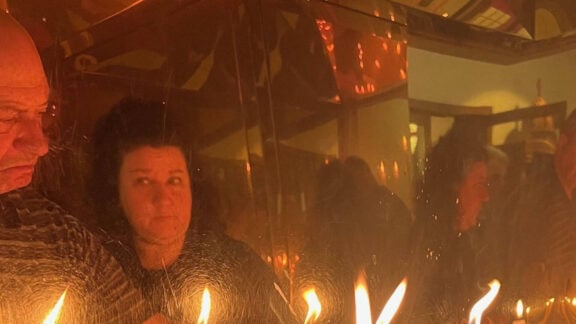No one can predict an election outcome until the votes are counted. Up until a few weeks ago, the Albanese government seemed destined to be a one-term administration or one that limps through as a minority government.
For the past 18 months, Labor has trailed the Coalition in the polls. However, with federal Treasurer Jim Chalmers set to deliver the government’s fourth budget today, an election is likely to be called soon after.
Labor stabilises as cost-of-living takes centre stage
Research from Accent Research and RedBridge Group suggests that “there’s been little movement in vote share since the last election.” The latest Roy Morgan survey shows Labor with its largest lead since August 2023—54.5 per cent, while the Coalition trails by nearly 10 points at 45.5 per cent.
While the election has yet to be called, one thing is clear, the Coalition has lost its footing. Labor’s $8.3 billion Medicare announcement, a traditional Labor policy strength, directly addresses cost-of-living concerns and has been endorsed by the Coalition, reflecting bipartisan recognition of the cost-of-living issues faced by middle Australia.
Kosmos Samaras, a RedBridge director, and a former Victorian Labor Party strategist, told Neos Kosmos that Labor has stabilised after 18 months of falling back.
“Labor has been able to stabilise its electoral position via a very good campaign to position a number of health policies in the cost-of-living space,” Samaras said.
Cyclone Alfred’s emergence over Queensland also prompted Albanese to delay his expected April 12 election campaign launch, a move that, according to Liberal insiders, threw the Coalition off balance.
Coalition stumbles but remains in the fight
The opposition had been poised to launch its campaign, with policies and attacks on Labor and Teal candidates prepared. However, the government has since regained control of the national agenda. Samaras told Neos Kosmos that “the Coalition’s inability to focus on anything that relates to the economy” has hurt them.
There are growing concerns within the Coalition that voters are slipping away from Dutton. A senior Liberal source, speaking anonymously, admitted: “It’s clear we’ve been swimming naked for three years as the tide has gone out.”
The Coalition’s nuclear energy plan remains vague at best, with no clear costings and a timeline aiming to “start producing electricity by 2035 (with small modular reactors) or 2037 (if modern larger plants are found to be the best option).”
Even if feasible, nuclear energy would not replace coal-fired power stations in time. By the time nuclear comes online, most coal plants will be decommissioned and largely replaced by renewables.
A leaked proposal by Dutton—dubbed a “soap bubble” by Albanese—to hold a referendum on expelling dual nationals who commit crimes has left many Coalition MPs blindsided. It has also received a lukewarm response from voters.
A senior Coalition figure was blunt in their assessment, “There are no policies to define us other than some nuclear plan that even we don’t want to speak about, and now a referendum to boot out dual nationals.”
“We’ve given up our seat at the kitchen table, leaving us to me-too a string of Labor policies that has given the prime minister control of the agenda again.”
The Trump factor
Dutton has echoed Trump’s anti-woke rhetoric with some success—that is, until Trump’s return saw him publicly attack key allies like Canada, the EU, and NATO nations. Trump’s economic nationalism, proposed tariffs on friendly nations, and rejection of free-trade agreements have unexpectedly helped struggling left-leaning parties outside America.
In Canada, newly appointed Liberal Prime Minister Mark Carney called a snap election for April 28, only days after taking office. Once seen as doomed to defeat, Canada’s Liberals have experienced a resurgence in polling, largely in response to Trump’s rhetoric. Trump’s tariffs against free-trade partners— referring to outgoing Liberal MP Justin Trudeau as “governor” while suggesting Canada should become the 51st US state— have helped the Canadian Liberals.
Trump’s proposed tariffs on Australian exports—including steel, aluminium, beef, and agricultural goods—along with US pressure for Australia to reduce subsidies for pharmaceuticals under the Pharmaceutical Benefits Scheme (PBS), have placed the Coalition in a difficult position. While the direct economic impact of US tariffs on Australia may be minimal, given the country’s major trading partners remain in Asia (China, Japan, South Korea, and India), the political ‘atmospherics,’ as Paul Keating once put it, have shifted.
Dutton argues that he is best placed to negotiate a deal with Trump, signalling to voters that he aligns with Trump’s global vision. However, Australian conservatives who previously embraced Trump’s cultural politics now face a difficult choice between being seen as economic patriots and US loyalists.
Trump’s shadow: A double-edged sword for the Coalition
Professor James Arvanitakis is Director of the Forrest Research Foundation and former director of Fulbright Australia, who has lived in red states and studied GOP voters. He believes Dutton made a strategic misstep by embracing Trump’s cultural agenda. “Dutton flirted with Trump by calling him a deep thinker, but since the tariffs, he has walked away,” he told Neos Kosmos.
The political researcher and commentator said that “Albanese has avoided direct attacks on Trump, hoping that staying neutral will allow for better negotiations—but this strategy has not entirely paid off.”
Arvanitakis noted that Dutton is now attempting to position himself as the “more natural Trump ally” while simultaneously keeping a safe distance. However, unlike in Canada and Mexico, where Trump’s policies have dramatically shifted voter sentiment, Australia’s response has been more measured.
“Many Australians have long harboured scepticism about the US, even while relying on them for defence and trade.”
“If Albanese can maintain stability and avoid any economic shocks, his measured approach to Trump may ultimately work in his favour,” Arvanitakis said.
Regardless of who wins the upcoming election, any Australian government, Labor or Coalition, will face a markedly different geopolitical landscape than before January 20, when Trump was inaugurated. The vision for global free market and the Western alliance led by the US—born of multilateral consensus between both conservatives and progressives for over 40 years—now seem uncertain.
Economic realities such as huge budget deficits and the need to increase revenue will require new approaches to taxation and expenditure. At least for now, given the government’s budget is set to be delivered tonight, Dutton has an opportunity to reset in his reply.








